The beekeepers and producers of ‘Coorg Honey’ said they want the authorities concerned to take their brand across the country and beyond and bring back the halcyon days when the hill district used to be the country’s top honey producer.
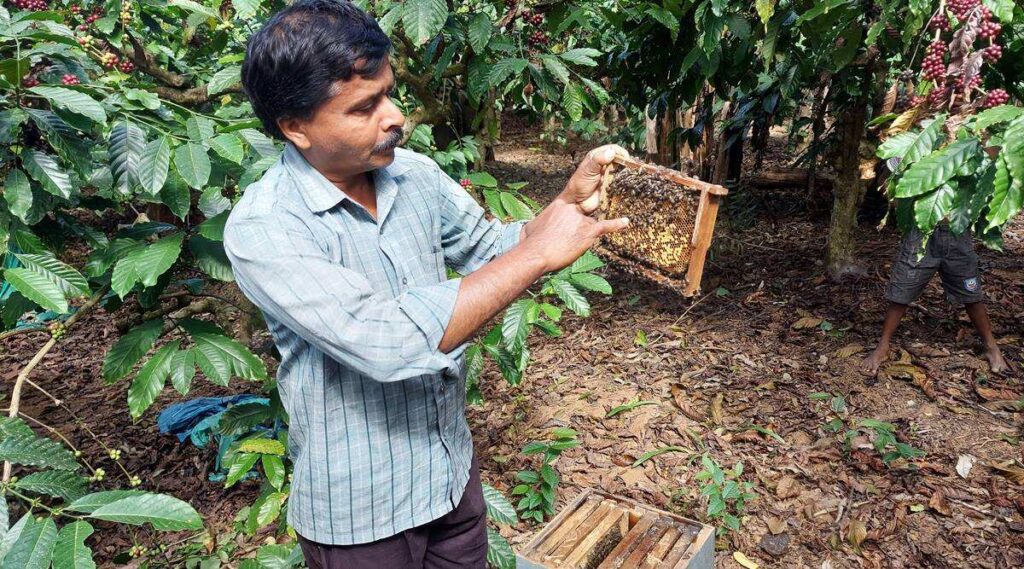
Be sweet with Coorg Honey. Those were the words of Sri Shambhavananda Swamiji from Sri Ramakrishna Mission who developed a unique method of bee-keeping known as ‘Coorg Standard Hive’ in the hilly district of south Karnataka-Coorg (Kodagu). Now, the beekeepers want the state government to not only make the practice sustainable but also go big on promoting brand ‘Coorg Honey’.
Citing a recent investigation by the Centre for Science and Environment (CSE), which found that honey sold by major brands in India was laced with modified sugar syrup, the beekeepers and producers of ‘Coorg Honey’ said they want the authorities concerned to take their brand across the country and beyond and bring back the halcyon days when the hill district used to be the country’s top honey producer.
After becoming the first president of Sri Ramakrishna Saradashrama in Coorg way back in 1928, Swami Shambhavananda initiated a bee-keeping project in the district knowing that the lush, hilly terrain presented an ideal setting for the practice which could also contribute to the local economy. In 1936, Swamiji set up the ‘Coorg Honey and Wax Producers Co-operative Society Ltd’, which, in time, became the first honey producers’ co-operative in the country.
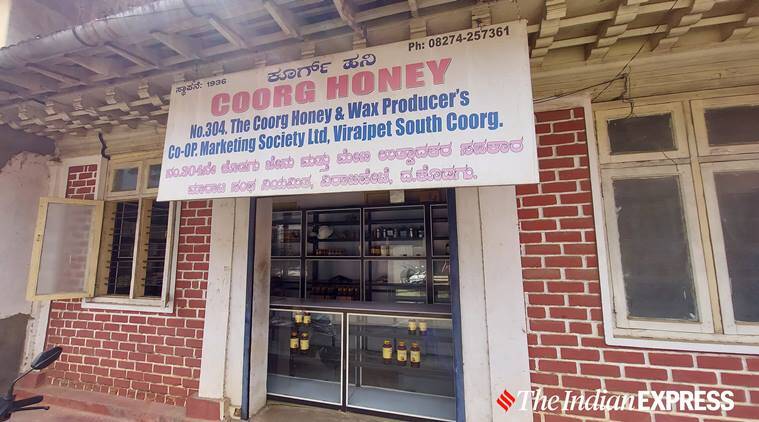
Over the last few years, the practice of bee-keeping and honey collection in the district has declined, to the extent that the Coorg Honey and Wax Producers Co-operative Society Ltd is now forced to procure honey from North Indian states just to keep their brand alive.
Speaking to indianexpress.com , Kodira Praveen Chengappa, former president of Coorg Honey and Wax Producers Co-operative Society Ltd, said, “Everyone who comes to Coorg, which is one of the country’s top tourist destinations, wants to take home a pot of ‘Coorg Honey’. However, the beekeepers in the district are not producing honey now like they used to. Since the production has reduced, our society has little option but to buy honey from beekeepers in Chikamagaluru, Karnataka, Bihar, Punjab and other places, who collect pure and original honey. We do a strict quality check then if the honey meets our standards, we sell it under the ‘Coorg Honey’ brand name.”
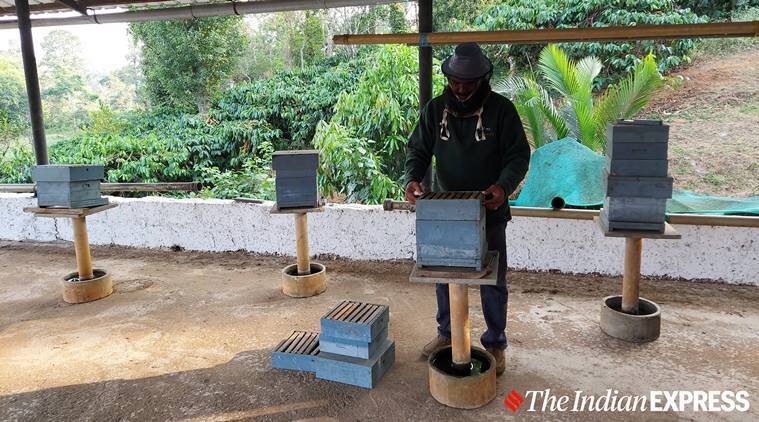
Apis Cerana bees, known as the honey bees of Coorg, still flock around the colourful indigenous flowers, lining the Western Ghats, drawing nectar. However, the practice of beekeeping has been severely hit.
“Earlier, many trees were planted and wildflowers, including coffee blossoms, paddy, ragi, were cultivated, drawing bees by the droves. However, honey collection has been severely dented as the use of pesticides these days is killing the bees,” Chengappa said.
Apiculture or beekeeping used to be one of the important farming activities in Coorg and contributed substantially to the income of local farmers. “In 1936, Shambhavananda Swamiji started the first honey producers’ co-operative in India at Virajpet in Coorg district. Later, in 1938, he founded the Ramakrishna Ashram and started to impart beekeeping lessons to local youth, who took an interest in the practice, at his office and a honey processing unit. He also sent local enthusiasts to beekeeping training centres in Pune and Coimbatore. He also marketed ‘Coorg Honey’ in Mumbai and other cities,” Chengappa said.
Though the production of ‘Coorg Honey’ has declined drastically, the former boss of the co-operative said the demand for the brand remains undiminished and with a bit of hand-holding from the government and other authorities concerned, the district could return to its glory days of honey making.
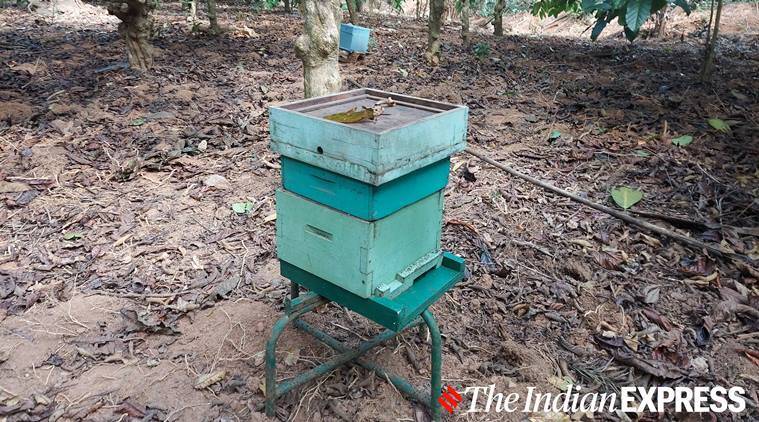
Traditional beekeepers, who have been harvesting honey since ages, are struggling these days as the honey bees of Coorg are declining in number, largely because of the use of pesticides. They said that radiations from mobile towers in the district are proving fatal for the bees.
Nagesh, an apiarist at Bittangala village in South Coorg who has been into beekeeping for three decades, told indianexpress.com, “I request our farmers not to use pesticides as it is because of these chemicals that the honey bees are dying. I have also seen the bees dying because of radiation from mobile towers. As much as 30 to 50 per cent of bees are dying due to mobile tower radiation and another 80 per cent because of the use of pesticides.”
Nestled in the midst of rolling hills and dense forests, Coorg experiences periodic shifts in climate and temperature, making it a favourable haunt for four major species of honey bees. According to Nagesh, a Coorgi, the honey tastes different as seasons roll and also at time of crop cultivation. “During the harvesting of coffee beans, the honey tastes very different compared to the season when paddy is cultivated,” Nagesh said, adding that the main four species of honey bees found in Coorg are Ponn thene (Apis dorsate) in forest areas, Potti thene (Apis cerena), Kaddi thene (Apis floria) and M ooli thene(Apis trigona), which are domesticated.
Beekeepers in Coorg keep around 30 to 50 bee boxes within an area of one to one-and-a-half kilometres, depending on the source of bee forage, in their coffee estate or areca nut farms. Nagesh said bee colonies, these days, is very hard to find as they are facing the risk of a colony collapse disorder where the majority of worker bees in a colony disappear.
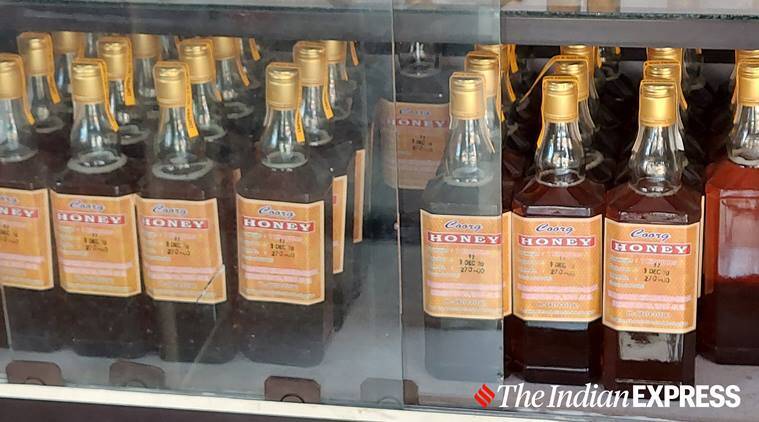
A beekeeper in Coorg can harvest 2-3 kgs of honey from one box. “Earlier we used to harvest 10 to 20 kgs of honey from one box. During the peak time, honey can be extracted once in 15 days from one box if there are strengthened colonies. However, that is not possible now,” Nagesh said.
The horticulture department has started providing Bee Hive Boxes and training to interested people at the beekeeping training centre in Bhagamandala, North Coorg. Founded in 1953, the centre provides three months of training, where students are taken through the basics of bee collecting, bee hiving and honey collecting or extraction, among other practices.
Prakash Mandanna, a beekeeper who took his lessons in the practice at Bhagamandala training centre, said, “After enrolling for a training course 10 years ago, I started beekeeping. However, six years later, the bees were afflicted with diseases such as Thai sac brood. Planting of exotic trees such as Silver Oak, Eucalyptus and Acacia Auriculiformis in the coffee estates affected pollinators and altered the native flora of Coorg.”
“The loss of forest cover and native trees is also an important reason for less honey bee production in Coorg. The government should focus on revival of bee production through the expansion of forest cover and forage plants in the district,” Mandanna told indianexpress.com.
He said the need of the hour is for the state horticulture department to promote beekeeping among the youth in the district. “Our government has undertaken various initiatives to promote beekeeping but the problem is that people are losing interest in the practice as the bees are not available in plantations and forests now. The horticulture department should come forward and support beekeeping in Coorg,” he said.
Officials in the horticulture department said various initiatives have been taken up in recent years to increase production of honey and provide subsidy to farmers interested in Apiculture.
Speaking to indianexpress.com, Dr Hemalatha, senior assistant director, Horticulture (Apiculture), said, “We have three different schemes at central, state and district levels to help farmers who are interested in apiculture. As part of the state sector, we are giving a budget for beekeeping development and under the central sector scheme, we are providing pollination support. We are also giving residential beekeeping training at the Bhagamandala centre in Coorg where approximately 15 to 20 interested farmers can take a training in beekeeping every year and earn a stipend.”
She said the horticulture department is also reaching out to farmers across the state, who are interested in beekeeping. “Our schemes are aimed at helping farmers interested in Apiculture and we are spreading the word through local newspapers and grama sabha meetings. Honey Mela is also organised every year in Bengaluru to promote Apiculture,” Hemalatha said.
source: http://www.indianexpress.com / The Indian Express / Home> Cities> Bangalore / by Darshan Devaiah BP, Coorg, Madikeri / February 15th, 2021

